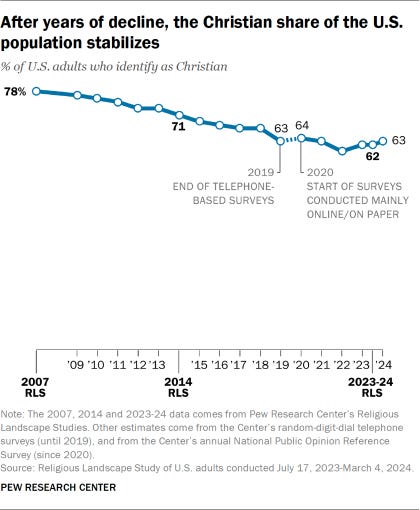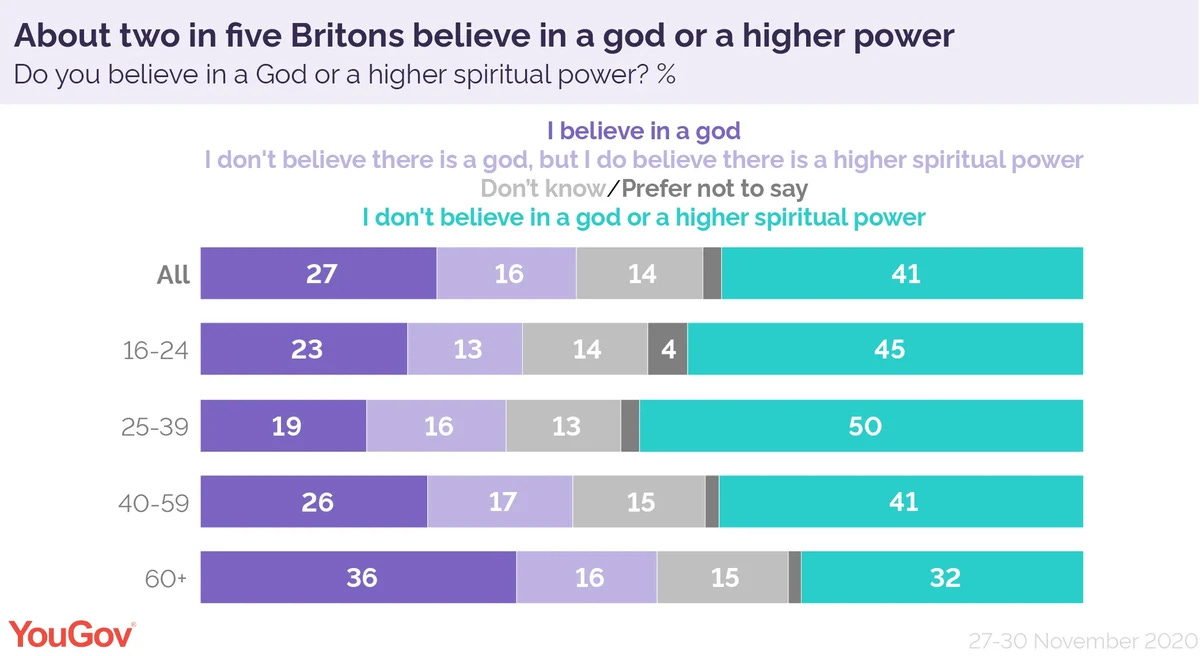A Religious Revival in the West
Does increased spirituality have a role to play in uniting society? It's time to take The Sniff Test.
A Hint of Rebirth
I took my first trip to the US in the early ’90s. A university friend was getting married and a group of us flew to New York before heading to Virginia for the wedding. Public transport being what it is, we hired a car from Washington D.C. and amused ourselves on the journey listening to religious radio. There was nothing like this in the UK.
Religious affiliation has declined since then, although not to European levels. Yet there is a hint of recovery on both sides of the Atlantic. The Spectator penned an article on Britain’s religious revival, while in France there was a 30% uptick in baptisms in 2024. Supporters of religion see this as necessary for the West to rediscover its purpose and to heal society’s divisions.
Is religion just another public institution in which the people have lost faith, or is it the source of Western revival?
The Case for Christianity
The historian Tom Holland argues in Dominion: The Making of the Western Mind that the values underpinning Western society are rooted in Christianity. Human rights, equality, secularism and atheism are all founded on moral assumptions shaped by Christian thinking.
Christianity emerged in opposition to the Classical World values of power and status. Humility, charity and human dignity became virtues rather than weaknesses. Even those who do not believe in God, hitch a free ride in the societies created by religious belief. Holland argues there is nothing universal or natural in liberal values and that they are Christian in origin.
Holland does not go easy on Christianity. He talks of virtuous violence and the Church’s role in the Crusades, the Inquisition, colonialism and slavery. He notes the medieval alignment with imperial and feudal powers to prioritise wealth, control and orthodoxy. He highlights the reinforcement of patriarchal authority and wonders whether the emphasis on victimhood enabled modern identity politics. That’s a considerable charge sheet.
These criticisms are not new. During the French Revolution, the Marquis de Condorcet drew the distinction between the moral and social value of personal beliefs and the power structures of the Church. It is possible to see tremendous benefits from public morality while despairing of the authority overseeing it. The idea of rebuilding a common morality from grassroots level, lies behind the calls for religious revival.
The Christian Coalition
In 1988, Reverend Pat Robertson challenged George H. W. Bush for the Republican nomination. He did well enough by opposing abortion, promoting school prayer and advocating a return to biblical morality, to establish the Christian Coalition. This was a major force in conservative politics in the ’90s. Robertson became more radical and at the end of the decade described Scotland as “a dark land” populated by homosexuals.
The number of people identifying as religious has declined from this supposed high. 63% of Americans identify as Christian, down from 90% in 1972 and fewer than half of 18 to 29 year olds do. In Europe, 70% of 16 to 29 year olds say they never attend religious services. The decline has been consistent this century, until now.
The fall coincides with increased political polarisation, epidemics of anxiety and depression, concerns over climate change and wealth disparity unknown for 100 years. It’s natural that faced with a relentless barrage of bad news, people would search for newfound belief.
While faith in religious institutions may have fallen, US belief in the supernatural did not. Over 90% of Americans believe in something spiritual beyond the natural world. This is significantly more than the 59% in the UK, where women are one third more likely to believe than men.
America is torn by political division and seeking repair. Europe is shocked by the need to defend itself and in search of unity. Is religion the answer?
Should We Be Religious
Last month, The New Yorker asked if we should be religious in a review of Ross Douthat’s Believe: Why Everyone Should Be Religious. The reviewer remained sceptical, while noting the book’s intended audience is spiritual people, rather than dyed-in-the-wool atheists.
Douthat does not argue that biblical stories provide psychological support, or that mysticism makes you happy. He believes that as science becomes more complicated to understand, the argument for intelligent design grows stronger. He made this point while highlighting the decline of the last two decades in a recent debate for The Free Press.
His debate partner Ayaan Hirsi Ali went one further, arguing for a Christian revival. She is a recent convert, having been an atheist and outspoken critic of Islam. She fled the Netherlands after the religious murder of director Theo van Gogh. The two collaborated on Submission, a short film critical of the treatment of women in Islamic society. Ayaan suffered genital mutilation at age five in Somalia.
Ayaan repeated Holland’s argument that atheists benefit from a society created by Christian values. She points to depression among teenagers as a cost of the loss of faith. Both she and Douthat went heavy on the argument “look at the mess we’re in”.
The weakness in this argument is that if anything else explains recent societal changes, then a decline in religion has no special claim to be the reason. In fact, its decline may be a symptom rather than a cause of what is happening.
Take depression and suicide, which were at a high this century in the UK in 2023. Suicides in the US reached a peak in 2022, with men four times as likely to take their own life. It is reasonable to argue that loss of physical labour, reduced access to family through divorce, increased medication, and even mobile phones have contributed to deteriorating mental health. There is only a limited role for religion.
Douthat’s arguments about science make even less sense. He references the multiverse interpretation of quantum physics, suggesting that intelligent design was a more plausible explanation. He mistakes quantum entanglement for consciousness. He also falls foul of David Deutsch’s argument that the universe is complicated enough, without adding another layer to explain God.
On the other side of the debate were Michael Shermer, founder of Skeptic magazine, and comedian Adam Corolla. Shermer argued that the growth of rationalism made it possible to be a moral citizen without believing in God. Corolla compared religion to Ozempic, a convenient prop and argued that personal responsibility was all that was required for better social outcomes.
The challenge with these debates is that the question do we need a religious revival becomes why should you believe in God. This misses the point about belief. If it leads to better outcomes for society as a whole, it does not matter whether the existence of God can be proven. Anything that unites a divided society should be encouraged.
Aspiring for a Better Life
People have different views of God. The intellectually acceptable interpretation is of something exceeding “our thoughts and concepts”, according to author Karen Armstrong. Religion is a series of behaviours, rather than beliefs to be proved or disproved.
There are many reasons why the West might need better behaviours. The idea that reduced religious affiliation is one of them, challenges the cyclical explanations that I write about a lot. That alone makes it worthy of consideration.
There is also the brute fact of the billions of people who identify with a faith. While those seeking to control religions can become obsessive and force their views on others, this does not devalue the everyday experience of the believer. This only becomes a threat with unswerving adherence to the dictates of religious leaders. Even then, there are enough useful idiots on university campuses prepared to align themselves with Muslim terrorists, to suggest that religion is not the sole problem. A wayward youth is nothing new. In the early ’70s, a quarter of young West Germans were sympathetic to the ideals of the terrorist Red Army Faction.
In Revolutionary France, the Marquis de Condorcet suffered the fate of many during the Reign of Terror. Initially in favour of the revolution, he drew the line at regicide and died in prison, outflanked to the left and labelled a counter revolutionary. The liberals started the revolt but were unable to stop it. In ’90s US, Robertson chose radicalism to stay at the forefront of the Christian Coalition, but turned moderate people away as a result.
Throughout history, the Church has prevailed by reclaiming the centre ground after periods of radicalism. This political manoeuvring is separate from the faith of individuals, the majority of whom have moderate beliefs and aspirations for a better life. Whether we choose the good life through religious beliefs, or the rationalism of the Enlightenment, an abundant mindset aspiring for a better life is what will revive the West.
It was Spring Break when my friends and I reached the lakeside retreat in Virginia. The bride-to-be was livid that as Best Man I had not turned up earlier and she hired me a tuxedo with trousers two inches too short. I headed to the beach bar to drown my sorrows, where my friends had engaged a group of girls from the local college. We passed a pleasant evening, which ended with a polite goodnight. This may not be the last time I am among born again Christians.








I am trying to imagine you in a room full of born again Christians ! Having wrestled with this image for long enough, I conclude the bar is the best place to be !
The Christian orders of service make reference to the Old Testament which to all intents and purposes, including the Ten Commandments, was the blueprint for a fundamentalist Jewish State, liberated by the Messiah from the persecution of the Egyptians and latterly the Roman Empire.
Today this would be called Zionism, supported by the Balfour Declaration because the Jewish people rejected two claimants to be the Messiah, namely Jesus Christ (around which Christianity was formed) and the Prophet Muhammad (around which Islam came into being).
I make this point firstly because this would evidence the first Great Schism which was the Jewish people between those who yearned for the Messiah and those who set humanity on the road to secularism, and secondly because of an obvious anomaly citing the Old Testament as a blueprint for Christianity
So should we be making a distincting between spirituality, which is something intangible that there is a better purpose to life than serving an elite human minority and political expediency, which the same elites use to further their own agenda ?
I think so and when I see there are moves afoot between Christian and Islamic clerics and theologians to bridge their differences centred around what the message of Jesus Christ really is, maybe a rise in spirituality is a sign that people, especially Gen Z, are seeing through much of the State sponsored, divisive b/s and are far better placed to take the baton forward
I conclude with this wonderful sketch from Yes Prime Minister
https://youtu.be/-nrZBtKWSfs?si=GwBifGc8BcQ-4o5X